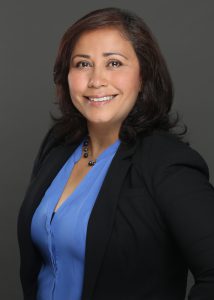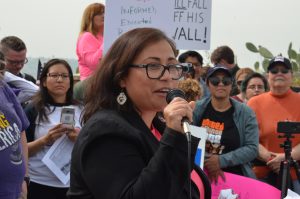Norma Chavez Peterson: Combining Forces to Help Immigrant Communities

Just a one day after being honored for her contributions to San Diego, Norma Chavez Peterson is back in her office squeezing meetings back to back to continue her life’s work of helping undocumented immigrant communities.
As the Executive Director of the American Civil Liberties Union of San Diego and Imperial Counties, she’s working on a system that allows organizations to combine forces in order to protect and educate immigrants on their rights.
That system, the San Diego Rapid Response Network, connects organizations and people to help immigrants and monitor immigration enforcement activities like checkpoints, raids, and arrests in San Diego County.
The way she sees it, many organizations are doing great work, but together they could accomplish much more, she said.
The system works through a 24-hour hotline manned by volunteers who answer calls from individuals in the community and provides emergency assistance, connect individuals with resources, and document raids, incidents of harassment, and arrests.
Chavez Peterson said that now more than ever organizations need to be bold and think together, which the system allows them to do so, and it also give people who want to make a change a vehicle to carry that out.
“We really wanted to create something to create the opportunity for people to participate in this idea that no one stands alone, that our community is stronger if we pull people together,” she said.
An immigrant herself, Chavez Peterson understands that it is through connecting with individuals who have a similar story that allows undocumented immigrants to remain strong.
At the age of five she arrived to the United States from her home of Michoacan, Mexico and was reunited with her mother and siblings.
“I didn’t know what documented or undocumented was,” Chavez Peterson said. “All I knew was that my family was going to be complete.”
Her mother, Esperanza, raised her seven children on her own and sought a better life for them in the U.S., while working several jobs to support them.
Chavez Peterson said her mother instilled the value of giving back, helping others, and being thankful, which has made her the person she is today.
“Part of what always drove me was the values and the commitment to wanting to make a difference and just to help people and to do good,” she said.

Growing up, Chavez Peterson understood the fears of traveling and staying in the dark for fear of deportation and although she was too young to understand what it meant to be undocumented, she witnessed her older sister face challenges when attempting to pursue a higher education.
“Immigration for me is not just something that me and my family have lived it’s something that impacts so many people in our communities and especially now,” she said.
The current political climate and anti-immigrant sentiment, she said, is familiar having grown up during the proposition 187 era, a ballot initiative that would prohibit undocumented immigrants from using state-run services, which opened the door to anti-immigrant rhetoric and propaganda.
“I feel like my immigrant experience has prepared me to do the work that I do now because I had to be resilient I had to survive, that was just my training ground for the battles that we are in today,” Chavez Peterson said.
She said that in her experience, if an undocumented individual is connected to an organization, community or network of people, the more knowledgeable they are about navigating through the immigration system.
The ACLU and other organizations are combining their efforts to coordinate different services to help people that need emergency services.
The Rapid Response Network launched in December and according to Chavez Peterson they have trained close to 200 people to answer calls and assist those who need help. She said that although it is still a system that they are working to perfect, they are doing their best to act on the “deportation machine.”
“We have to literally build an army of immigrant protectors in our community, it can not be just the organizations, it can not just be one or two or five immigrants rights leaders that are always on TV it’s got to be masses and masses of people,” Chavez Peterson said.






